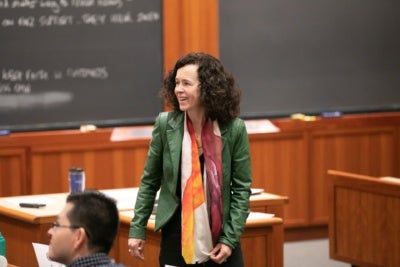The Ideas Worth Teaching Awards seek to honor exceptional teaching that prepares students to respond to issues that are dramatically altering our economies and societies—from inequality, to climate change, to the expansion of automation and AI. As the Business & Society Program seeks nominations for the newest cohort of winners, we spoke with a 2018 winner whose course captures this spirit of change. With Reimagining Capitalism, the course she co-teaches with George Serafeim at Harvard Business School, Rebecca Henderson has created a space where students can challenge received economic wisdom and map out concrete strategies to transform the system over the course of their own careers.
We’ve seen surveys that show younger Americans increasingly skeptical of capitalism and looking at alternative models. What kind of students take your course Reimagining Capitalism, and what’s the response like?
I first started teaching “Reimagining Capitalism” in 2012. There were 28 students in the room. They loved the course, as did I. We all felt that the dominant understanding of capitalism was “off” in some important ways, and it was a revelation to have the time to think together about what the alternatives might be. The course created significant buzz, and the next year nearly 400 students applied to take it —nearly half the entire second year class. This year we have ~300 students enrolled in four sections. We tend to have fewer students with finance backgrounds than the MBA class in general and a disproportionate number have some form of non-profit or government experience, but otherwise it’s a broadly representative group.
Is there a plausible path forwards to building a just and sustainable world, and if there is, how can business help?
The students seem to really enjoy the course. I don’t have to work to persuade them that business as usual is likely to take us to a very bad place. They are deeply connected. One of the pleasures of teaching is that I’m typically deluged with podcasts to listen to, videos to watch and pieces to read online, and they often know more about the latest climate science or inequality statistics than I do.
They have, in general, three questions. The first is the obvious one—they want to know what can be done. Is there a plausible path forwards to building a just and sustainable world, and if there is, how can business help? The second is more personal. They want to know how they can help. They believe that individual CEOs might be able to shift things, but they worry that—at 29 or 34—there is not much that they, personally can do. And perhaps most intriguingly, they want to know how they can talk about these issues in ways that people who might disagree with them can hear. They want to be change agents—smart, thoughtful, engaged, accessible.
Capitalism is being critiqued from a variety of different disciplines and media now. What was the thought process in designing an intervention in this discussion that would be new and distinctive to Harvard Business School?
My first priority in designing the course was to make it deeply practical. HBS has always been a hands on kind of place, since the case method means that one is constantly asking “but what would you do?” and I didn’t want to lose that sense of the importance of action on the ground. But at the same time I wanted to support the students in thinking about the larger structural issues implicit in actually reimagining capitalism—again, in a way consistent with the reliance on induction that is implicit in a reliance on the case method. The course is thus heavily case based and when this isn’t appropriate—as, for example, when we discuss the nature of public goods, the latest research on motivation or the problem of inequality—it draws on materials designed to support the students in working out the nature of the issues for themselves.

Professor Henderson in the classroom
My second goal was to ensure that the course focused explicitly on the importance of systemic change. Individual firms can do amazing things, and by definition change must start with concrete action on the ground. But the problems we face can’t be solved without fundamental shifts in the ways we think about the role of firms, the metrics we use to measure success and significant change in the institutions that balance and constrain the free market. The course thus grapples explicitly—using the case method! —with whether and how we can rewire the financial markets, implement effective self-regulation, reshape our expectations of the private sector and work effectively with government and civil society to create the rules and expectations that might enable us to make capitalism genuinely free and fair.
Your research touches on very macro-level themes—countries in a global system of capitalism. Why do you believe that managers have a special role to play in sustaining free and fair capitalism?
Why firms? Why managers? The easy way to reimagine capitalism is to reimagine institutions—to dream up new policies and to sketch out new roles for government. I’m sure that effective, transparent, democratically elected governments are central to solving the problems that we face. But I’m also sure that effective, values driven firms who are willing to take responsibility for the health of the system are also critically important. We need global action if we are to solve problems like climate change, and the great multinational firms have the power to act globally—something that very few governments have. We need an explosion of innovation, and firms have the resources required to invent and then to deploy innovation at scale. We need to find ways to move beyond political polarization, to find common ground in finding solutions to the problems we face, and firms can sometimes play central roles as catalysts in supporting the kind of pragmatic, problem orientated conversations that lead to change.
We live at a moment when there’s a very real danger that the rich and the powerful will leave the rest of us—and the planet—outside in the cold
But firms are also central to the struggle to build free and fair capitalism because they have so much political and economic power. We live at a moment when there’s a very real danger that the rich and the powerful will leave the rest of us—and the planet—outside in the cold. Persuading some fraction of the private sector that this is a disastrous course—not only for our society and our environment but also for the private sector is, I believe, critically important to reversing direction. We need firms to be deeply committed to things like well-designed regulations that can drive innovation to clean up the environment, and to changes in labor and tax law that are likely to increase labor force participation and reduce income inequality and to the importance of the free media and of transparent and engaged democracy if are to make progress. As long as most business people believe that their only duty is to maximize investor returns—no matter the cost on the world around them—it will be hugely difficult to turn things around.
Time and missed opportunities are a major theme in a lot of recent climate coverage, like the big New York Times story last year (“Losing Earth: The Decade We Almost Stopped Climate Change”). What does it take over a career in business to work on this issue, especially if you don’t have ‘sustainability’ in your job title?
To me this question has two important components. The first is the “how” questions—what job should I take, where are the real levers for change, and can anyone under 50 really make a difference? This is an issue we tackle at length in my course, and the good news is that there are lots of opportunities in business for those who want to make a difference, from working for the small, values driven entrepreneurial companies that are shaking up the established firms by pioneering new ways of working, to working for the established firms who have the power to drive change, and to working in finance and consulting to change the conversation.
Paul Polman could only commit Unilever to sustainability at scale because the firm was full of people who were already trying to make a difference
It’s easy to fixate on senior leaders as the only reliable drivers of change—but such a fixation misses the fact that leaders without effective followers are merely people who give great speeches—and the fact that in practice most senior people are critically dependent on the young people around them for the ideas they need to lead. Paul Polman could only commit Unilever to sustainability at scale because the firm was full of people who were already trying to make a difference—and who were showing that it could be done. The world is changing, and changing very fast. Every organization in the world is going to need people who have thought carefully about how to respond.
But to my mind the “how” question is not the critical one. The critical question is “why”—why should I spend any time at all trying to fix the enormous problems that we face, given that even in the best of all possible worlds any single individual is unlikely to have much of an impact, life is short, and there are much easier ways to make a living? Building a just and sustainable economy will require the deployment of a huge range of technologies in ways we’re only just beginning to understand—from systems that deliver pesticides and fertilizers by the drop to machines that can recycle anything we throw at them. There will certainly be (lots of) money to be made in building the firms that drive this change. But in my experience this isn’t the most important reason to act. The business people I know—the ones that are really making a difference—are motivated as much by the sense that attempting to fix these problems is the only way to keep peace with the deepest part of themselves—the part that knows that in the end we are all only dust on the wind and that while we live, to work together with others who care in service and in joy is, if not the only way to live, surely much the most rewarding.
Nominate a scholar for the Ideas Worth Teaching Award!
![]()
Interested in more innovative insights for business education? Browse our complete collection of interviews with outstanding educators, and subscribe to our weekly Ideas Worth Teaching digest!

